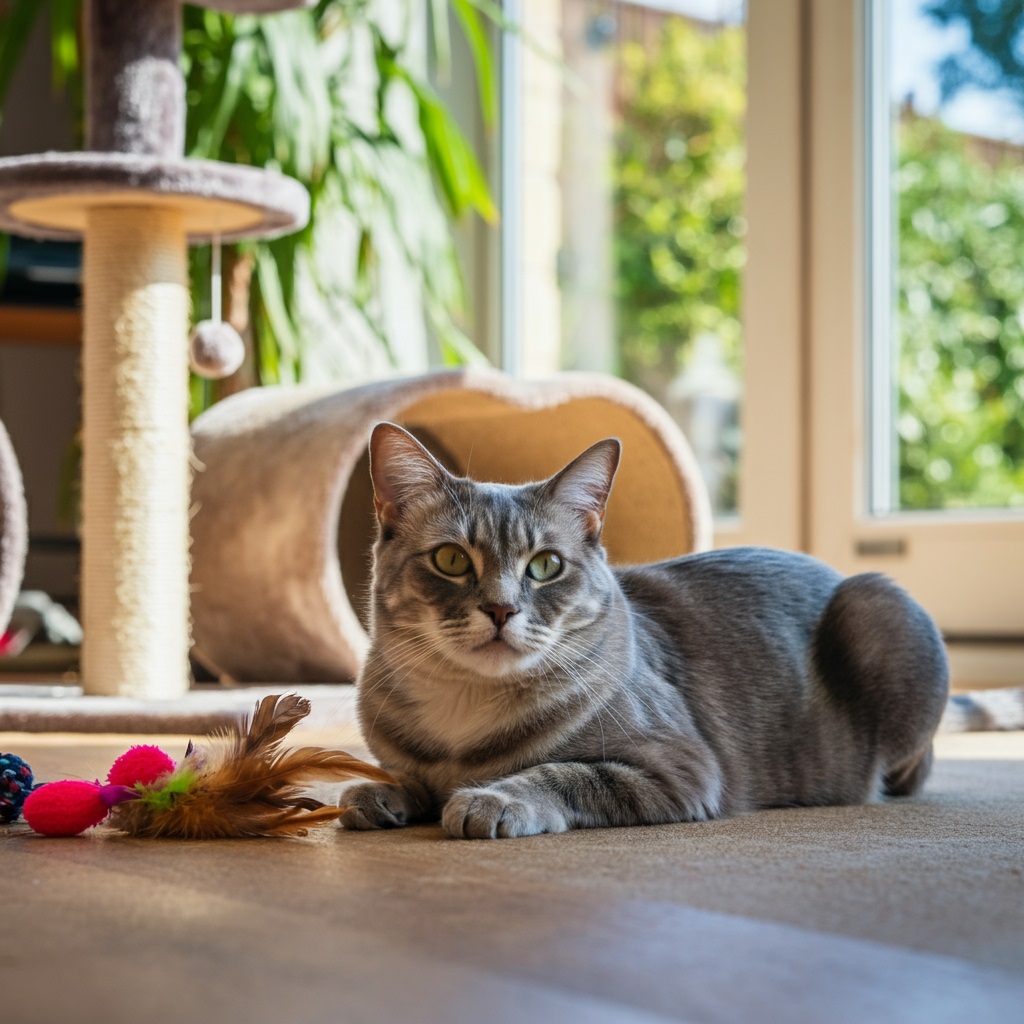
Cats are often seen as independent, low-maintenance pets, but behind their graceful and self-sufficient exteriors, they can face various health challenges. Identifying and addressing these common issues early can significantly improve your feline friend’s quality of life. This blog explores the most frequent cat health problems and provides tips on how to prevent them, ensuring your cat stays healthy and happy.
Understanding Common Cat Health Issues
Cats are experts at hiding illness or discomfort, which can make it difficult for owners to detect health problems. By learning about common cat health issues, you can stay proactive and recognize warning signs before they escalate.
1. Obesity
Obesity is one of the most prevalent health issues in cats. It not only lowers a cat’s overall quality of life but also increases the risk of severe conditions such as diabetes, arthritis, and heart problems.
Signs of Obesity in Cats
- Noticeable weight gain
- Difficulty jumping or moving
- Lack of a defined waistline
- Lethargy
How to Prevent Obesity
- Monitor Portions: Follow portion recommendations based on your cat’s weight and age. Overfeeding, even with high-quality food, can lead to weight gain.
- Encourage Play: Invest in toys that keep your cat physically active, such as laser pointers, feather wands, or automated ball chasers.
- Limit Treats: While tempting to spoil your cat, reserve treats for special occasions or use low-calorie options.
2. Dental Disease
Dental health is frequently overlooked in cats but plays a critical role in their overall well-being. Studies estimate that over 70% of cats over the age of three show signs of dental disease.
Common Symptoms
- Bad breath
- Difficulty eating
- Red or swollen gums
- Drooling
Preventative Measures
- Regular Teeth Brushing: Use feline-specific toothbrushes and toothpaste to remove plaque buildup.
- Dental Treats: Consider giving your cat dental chews or treats designed to promote oral hygiene.
- Vet Checkups: Schedule professional dental cleanings when recommended by a veterinarian.
3. Urinary Tract Issues
Urinary tract problems, such as feline lower urinary tract disease (FLUTD), are common in cats. These issues can range from mild infections to life-threatening blockages.
Symptoms to Watch For
- Frequent trips to the litter box with little urine output
- Straining or crying while urinating
- Blood in urine
- Lethargy or hiding
Prevention Tips
- Hydration is Key: Ensure your cat drinks plenty of water daily. Wet food can also increase hydration.
- Litter Box Maintenance: Keep litter boxes clean and offer multiple boxes in multi-cat households.
- Dietary Measures: Provide a veterinarian-recommended diet to promote urinary health.
4. Parasites
Parasites, such as fleas, ticks, and worms, are a common nuisance for cats that can lead to more serious health complications if untreated.
Signs of Parasite Infestation
- Excessive scratching or grooming
- Visible fleas, ticks, or flea dirt
- Vomiting or diarrhea
How to Protect Against Parasites
Continues after advertising
- Preventive Medication: Use veterinarian-prescribed flea, tick, and deworming medications.
- Regular Grooming: Brush your cat’s fur and check for any signs of parasites regularly.
- Indoor Living: Keeping your cat indoors can reduce exposure to fleas, ticks, and other parasites.
5. Hairballs and Digestive Issues
While grooming, cats ingest hair, which can sometimes accumulate in their digestive systems as hairballs. These are generally harmless, but excessive hairballs can cause blockages and digestive distress.
Symptoms of Digestive Issues
- Frequent vomiting (beyond occasional hairballs)
- Loss of appetite
- Lethargy
Prevention
- Regular Brushing: Brush your cat often, especially long-haired breeds, to reduce hair ingestion.
- High Fiber Diets: Some cat foods are formulated to help with hairball management.
- Hydration and Exercise: These can aid in digestive health and reduce the frequency of hairballs.
6. Kidney Disease
Chronic kidney disease (CKD) is a common condition in senior cats, and early detection is crucial.
Symptoms
- Increased water consumption and urination
- Weight loss
- Vomiting
- Bad breath (often with an ammonia-like smell)
Prevention Strategies
- Routine Vet Visits: Annual check-ups can help detect early signs of CKD.
- Balanced Diet: Feeding your cat a high-quality diet appropriate for their age reduces strain on the kidneys.
- Encourage Hydration: Cats with healthy kidneys tend to drink plenty of water.
7. Respiratory Issues
Upper respiratory infections are particularly common in kittens and shelter cats. These infections can be viral, bacterial, or fungal in nature.
Symptoms to Recognize
- Sneezing and nasal discharge
- Watery or red eyes
- Lack of appetite
- Coughing
Ways to Prevent Respiratory Issues
- Vaccinations: Ensure your cat is up-to-date on core vaccines.
- Quarantine New Pets: Keep new pets separate until they’ve been examined by a vet.
- Minimize Stress: A calm environment and regular routines can boost your cat’s immune system.
Building a Proactive Health Plan for Your Cat
Preventing health issues is always better than treating them. Consider these general tips to maintain your cat’s health:
- Routine Veterinary Care: Regular check-ups can catch potential problems early.
- Healthy Diet: Feed your cat high-quality food tailored to their specific nutritional needs.
- Indoor Lifestyle: Protect your cat from external dangers like cars, predators, and disease by keeping them indoors.
- Mental Stimulation: Use puzzles, toys, and interactive play to keep your cat mentally sharp and happy.
- Know Your Cat: Pay attention to any changes in behavior, appetite, or energy levels, as these could signal underlying issues.
Read More👉 Training German Shepherds Tips for Success
Empowering You to Keep Your Cat Healthy
Cats enrich our lives with their companionship and quirkiness, and as responsible owners, it’s our duty to ensure their health and well-being. By staying informed about common health issues and adopting preventative measures, you can provide your furry friend with the care they deserve.
If you’re uncertain about your cat’s health or need tailored advice, schedule a visit with your veterinarian. Your vigilance, combined with professional guidance, can significantly extend the years you have with your beloved feline companion.



